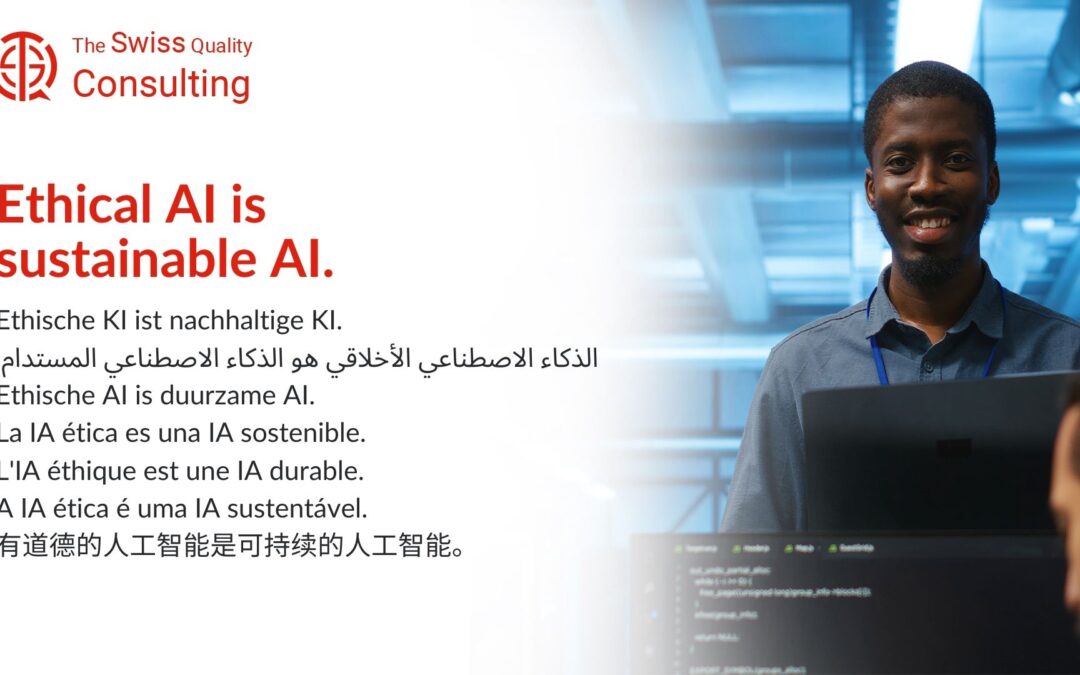Integrating Ethical AI into Business Operations
The Importance of Ethical AI
Ethical AI in business is becoming increasingly crucial as organizations leverage advanced technologies to drive innovation and efficiency. Ethical AI refers to the development and deployment of artificial intelligence systems that adhere to ethical standards, ensuring fairness, transparency, and accountability. In regions like Saudi Arabia and the UAE, where technological advancements are accelerating, integrating ethical AI is essential for achieving sustainable business success. Ethical AI not only mitigates risks associated with bias and discrimination but also enhances trust among stakeholders, fostering a positive business reputation.
The adoption of ethical AI aligns with the broader goal of corporate social responsibility (CSR). By ensuring that AI systems are designed and implemented ethically, businesses can demonstrate their commitment to ethical practices and social values. In Riyadh, for example, companies are integrating ethical AI to enhance their decision-making processes while ensuring that these decisions are free from bias and discrimination. This approach not only improves operational efficiency but also strengthens the company’s reputation and stakeholder relationships.
Furthermore, ethical AI contributes to long-term sustainability by promoting responsible innovation. By adhering to ethical guidelines, businesses can avoid the pitfalls of unethical AI practices, such as data breaches and privacy violations. In Dubai, organizations are investing in ethical AI to ensure that their technological advancements contribute to sustainable growth and development. This commitment to ethical AI not only drives business success but also aligns with national objectives of promoting innovation while safeguarding ethical standards.
Change Management for Ethical AI Integration
Effective change management is critical for the successful integration of ethical AI into business operations. Change management involves guiding organizations through the transition process, ensuring that employees and stakeholders are aligned with new technologies and practices. In Saudi Arabia and the UAE, where businesses are rapidly adopting AI, implementing ethical AI requires a strategic approach to change management that addresses both technical and cultural aspects.
The first step in change management for ethical AI is to develop a clear vision and strategy. Business leaders must articulate the importance of ethical AI and outline the steps required to achieve it. In Riyadh, executive coaching services are being utilized to help leaders navigate the complexities of ethical AI integration. These coaching services provide leaders with the skills and knowledge needed to drive change effectively, ensuring that the transition to ethical AI is smooth and successful.
Communication is another crucial element of change management. Leaders must ensure that all employees understand the benefits and implications of ethical AI. In Dubai, companies are using effective communication strategies to engage employees and address their concerns about AI technologies. By fostering an open dialogue and providing training on ethical AI principles, businesses can build a culture of trust and collaboration, which is essential for the successful implementation of ethical AI.
The Role of Executive Coaching in Ethical AI Adoption
Executive coaching plays a vital role in facilitating the adoption of ethical AI within organizations. Executive coaching services provide business leaders with personalized guidance and support, helping them navigate the challenges associated with ethical AI integration. In regions like Saudi Arabia and the UAE, where leadership development is a priority, executive coaching is becoming an essential tool for driving ethical AI initiatives.
Through executive coaching, leaders can develop a deep understanding of ethical AI principles and learn how to apply them in their decision-making processes. In Riyadh, executive coaching programs are tailored to address the specific needs of business leaders, providing them with the skills and insights needed to lead ethical AI initiatives. These programs focus on developing critical leadership skills, such as strategic thinking, effective communication, and ethical decision-making, which are essential for promoting ethical AI within organizations.
Moreover, executive coaching helps leaders build the resilience and adaptability needed to manage the complexities of ethical AI adoption. In Dubai, executive coaching services are supporting leaders in navigating the rapidly changing technological landscape. By fostering a growth mindset and encouraging continuous learning, executive coaching enables leaders to stay ahead of technological advancements and ensure that their organizations remain competitive while adhering to ethical standards.
Leveraging Modern Technologies for Ethical AI
Blockchain and Ethical AI
Blockchain technology offers significant potential for enhancing the ethical implementation of AI systems. Blockchain provides a decentralized and transparent framework that ensures data integrity and security, which are critical for ethical AI. In Saudi Arabia and the UAE, businesses are exploring the integration of blockchain with AI to enhance transparency and accountability in AI-driven processes.
By using blockchain, companies can create immutable records of AI decision-making processes, ensuring that these processes are transparent and verifiable. In Riyadh, for example, businesses are leveraging blockchain to enhance the transparency of their AI systems, ensuring that stakeholders can trust the outcomes generated by these systems. This transparency is particularly important in sectors such as finance and healthcare, where the ethical implications of AI decisions can have significant impacts on individuals and society.
Moreover, blockchain can enhance data privacy and security, addressing some of the ethical concerns associated with AI. In Dubai, companies are integrating blockchain with AI to ensure that sensitive data is protected and that data usage complies with ethical guidelines. By securing data on a blockchain, businesses can prevent unauthorized access and ensure that data is used responsibly, aligning with ethical AI principles.
The Metaverse and Ethical AI
The Metaverse represents a new frontier for ethical AI, offering immersive and interactive digital environments where AI can play a transformative role. As businesses in Saudi Arabia and the UAE explore the potential of the Metaverse, integrating ethical AI is essential to ensure that these digital environments are inclusive, fair, and secure. Ethical AI can enhance user experiences in the Metaverse by ensuring that interactions are free from bias and that data privacy is maintained.
In Riyadh, businesses are developing AI-driven applications for the Metaverse that prioritize ethical considerations. These applications leverage AI to create personalized and engaging user experiences while adhering to ethical guidelines. By incorporating ethical AI, businesses can ensure that the Metaverse is a space where users feel safe and valued, fostering trust and engagement.
Additionally, the Metaverse offers opportunities for businesses to demonstrate their commitment to ethical AI. In Dubai, companies are using the Metaverse to showcase their ethical AI initiatives, creating virtual experiences that highlight their dedication to responsible innovation. By leveraging the Metaverse as a platform for ethical AI, businesses can enhance their reputation and build stronger relationships with stakeholders.
Generative AI and Ethical Considerations
Generative AI, which involves AI systems that can create content such as text, images, and music, presents unique ethical challenges and opportunities. As businesses in Saudi Arabia and the UAE adopt generative AI, ensuring that these systems are developed and used ethically is crucial. Generative AI has the potential to drive innovation and creativity, but it must be guided by ethical principles to prevent misuse and ensure positive outcomes.
In Riyadh, companies are exploring the use of generative AI to enhance their marketing and customer engagement strategies. By using ethical guidelines to govern the use of generative AI, businesses can create content that is not only engaging but also responsible and inclusive. This approach ensures that generative AI contributes to business success while adhering to ethical standards.
Moreover, addressing the ethical implications of generative AI requires robust governance frameworks. In Dubai, businesses are implementing governance structures to oversee the development and deployment of generative AI systems. These structures ensure that generative AI is used responsibly, with clear guidelines on data usage, content creation, and ethical considerations. By establishing strong governance frameworks, businesses can mitigate risks and harness the potential of generative AI in a responsible manner.
Conclusion: The Path Forward for Ethical AI
Ethical AI is not just a technological consideration but a strategic imperative for businesses aiming for sustainable success. As organizations in Saudi Arabia and the UAE continue to embrace AI, the integration of ethical AI principles will be critical in shaping their future. By focusing on transparency, accountability, and responsible innovation, businesses can harness the power of AI while maintaining trust and ensuring long-term sustainability.
Effective change management, leadership, and executive coaching are essential for the successful adoption of ethical AI. Leaders must foster a culture of ethical decision-making and ensure that their teams are equipped with the necessary skills and knowledge. In regions like Riyadh and Dubai, where technological advancements are rapidly transforming industries, the commitment to ethical AI will be a key differentiator for business success.
In conclusion, the integration of ethical AI into business practices offers a pathway to sustainable growth and innovation. By leveraging modern technologies and fostering a culture of ethical decision-making, businesses in Saudi Arabia and the UAE can achieve their strategic objectives while upholding the highest ethical standards. The future of business lies in the responsible and ethical use of AI, and by prioritizing ethical AI, organizations can pave the way for a more inclusive, transparent, and sustainable future.
#EthicalAI #SustainableAI #ArtificialIntelligence #BusinessSuccess #ChangeManagement #ExecutiveCoaching #EffectiveCommunication #ManagementConsulting #LeadershipSkills #ProjectManagement #SaudiArabia #UAE #Riyadh #Dubai













